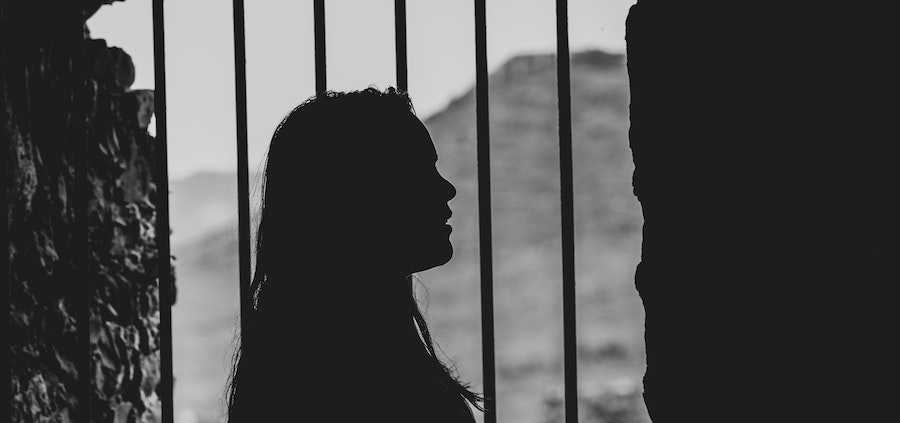The Forgotten Work of Mercy by Hank Mattimore
Noah is a tall, street-savvy 16-year-old with an easy smile, the kind of kid his peers think of as cool. But he wasn’t being cool now. He was just a lonesome kid who had gotten into trouble and found himself in juvenile hall. “I feel sort of, like, forgotten,” he says. “We’re isolated here. Who cares what happens to us? It’s a weird feeling. I don’t know if people even know we’re in here.”
Noah’s experience of feeling alienated from the world outside prison walls is not uncommon. The estimated 80,000 youth serving time in juvenile halls throughout our country (the United States has incarcerated a higher percentage of its youth than any other nation) remain largely invisible to the ordinary citizen. Out of sight, out of mind.
I became involved with volunteering as a spiritual advisor at our local juvenile hall quite by accident. A friend of mine who knew I had mentored foster kids told me that there was a shortage of adult volunteers at the local “juvie.” To tell you the truth, I had never given much thought to mentoring teens in juvenile prison. I had been focused on helping kids stay OUT of prison. Suddenly it hit me that counseling kids who had made mistakes and helping them to turn their lives around was a calling I could not refuse.
So several months later I find myself talking quite comfortably not only with Noah but with many other youth whom society describes as hardened criminals or delinquents. To me they fit neither of these labels; they are only fellow human beings who need someone to listen to their story. My role is not to admonish them for what they have done wrong (they are already in prison, after all) but to enter into a relationship with them, to remind them that they too are children of God and “that God makes no junk.”
Of the kids I see, only a handful are Christian. So I view my work with them as a kind of pre-evangelization. I simply try to convey to them that God loves them with a love that will not go away. The spirit of God is within them, and he has a role for them in life that no one else can accomplish.
While visiting those in prison is one of the seven corporal works of mercy, my experience has been that the other six are likely to draw more attention. We have a long tradition of service when it comes to feeding the hungry and giving drink to the thirsty and clothing the naked. Every parish I have ever been a part of has a ministry to the poor that includes a food pantry and clothes closet for needy folks. Most parishes have a committee that makes sure the sick are visited and that members of the church are there for the memorial services for the deceased.
But visiting those in prison is a little more difficult. Like any bureaucracy, there are rules and regulations that make it challenging to visit with an inmate unless they are a family relation. But thanks to “friendly visitor” programs in many juvenile facilities, it is not that difficult to connect with one of the inmates (especially inmates who do not have any family members).
However, I submit that the reason we are reluctant to visit incarcerated young people has deeper roots. Consciously or unconsciously, we are weighing the merits—dare I say, the worthiness—of those incarcerated. Feeding the hungry? That’s a no-brainer. We can relate. Donating our canned goods or lightly used clothes to the poor? Of course. These are tangible human needs and the results are visible and immediate. Yes, we proudly announce, we delivered six hundred baskets of food to the poor last month.
But visiting young inmates at the local juvenile hall is different. It is simply not as easy to feel compassion for tough teens who may very well have been involved with gangs, stolen property or dealt drugs on the street, or dropped out of school. Some may be accused of serious crimes, including rape or even murder. Isn’t there a part of us that thinks, “They made their bed; let them lie in it.”
All you need to do as a Christian is to imagine those words, that judgment coming from our Lord Jesus Christ. Can you hear him now saying to the woman caught in adultery, “Too bad, woman. You knew the law, now live with the consequences”? No, we can’t even imagine Jesus saying those words because our God is a God of second chances. He could not walk away from that sinful woman any more than we should walk away from a 16-year-old kid locked up in juvenile prison today.
Hank Mattimore is a freelance writer and a member of Resurrection Parish in Santa Rosa, California. Until recently he was a volunteer spiritual adviser to youth at the Sonoma County Juvenile Detention Center. He is also a former member of the Oblates of Mary Immaculate.





Leave a Reply
Want to join the discussion?Feel free to contribute!